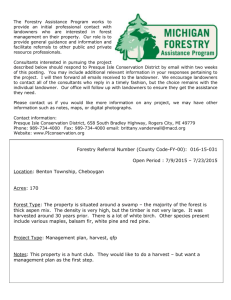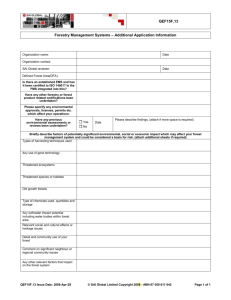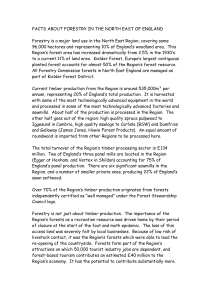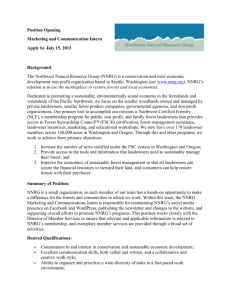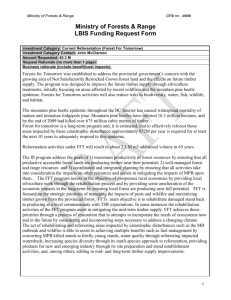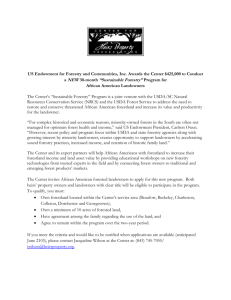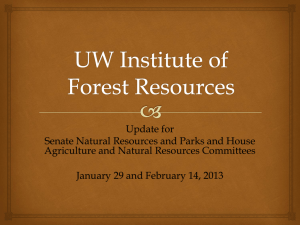this document - Institute for Agriculture and Trade Policy
advertisement
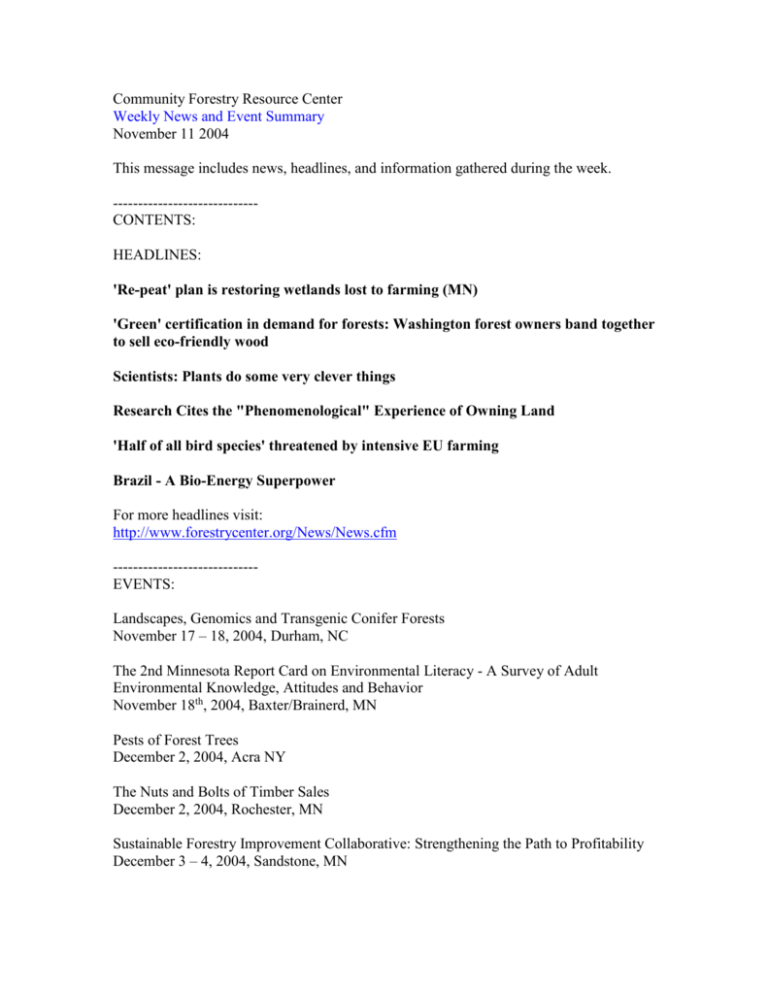
Community Forestry Resource Center Weekly News and Event Summary November 11 2004 This message includes news, headlines, and information gathered during the week. ----------------------------CONTENTS: HEADLINES: 'Re-peat' plan is restoring wetlands lost to farming (MN) 'Green' certification in demand for forests: Washington forest owners band together to sell eco-friendly wood Scientists: Plants do some very clever things Research Cites the "Phenomenological" Experience of Owning Land 'Half of all bird species' threatened by intensive EU farming Brazil - A Bio-Energy Superpower For more headlines visit: http://www.forestrycenter.org/News/News.cfm ----------------------------EVENTS: Landscapes, Genomics and Transgenic Conifer Forests November 17 – 18, 2004, Durham, NC The 2nd Minnesota Report Card on Environmental Literacy - A Survey of Adult Environmental Knowledge, Attitudes and Behavior November 18th, 2004, Baxter/Brainerd, MN Pests of Forest Trees December 2, 2004, Acra NY The Nuts and Bolts of Timber Sales December 2, 2004, Rochester, MN Sustainable Forestry Improvement Collaborative: Strengthening the Path to Profitability December 3 – 4, 2004, Sandstone, MN Exploring Stand Density and its Relationship to Wood Value December 7 – 8, 2004, Kelowna, BC, Canada For more event listings visit: http://www.forestrycenter.org/Calendar/Cal.cfm ----------------------------INFORMATION: University of Illinois position: Visiting Leadership Program Coordinator New USGS Web site: The Water Cycle Rural Entrepreneurship: New Best Practices Guide from Aspen Institute For more documents and information visit: http://www.forestrycenter.org/Search/search.cfm ----------------------------PUBLICATIONS: Conducting a Successful Timber Sale: A primer for landowners Red, White, Blue, and Green: Politics and the Environment in the 2004 Election Balancing Ecology and Economics: A Start-up Guide for Forest Owner Cooperation, 2nd Edition -----------------------------HEADLINES: 'Re-peat' plan is restoring wetlands lost to farming (MN) Decades ago, people dug a lot of ditches to try to drain portions of the vast swamps northwest of Duluth, the better to grow crops. Today such swamps are known as wetlands, and it's illegal to drain or pave even an acre of one without adding or restoring at least an acre somewhere else. And that's why scientists from the University of Minnesota have been plugging ditches at the Fens Research Facility, a 350-acre tract near Zim. http://www.startribune.com/stories/462/5061761.html OR http://www.forestrycenter.org/News/news.cfm?News_ID=610 ----------------------------'Green' certification in demand for forests: Washington forest owners band together to sell eco-friendly wood There are tall, thick alders and gargantuan maples on John Henrikson's land that could line his pockets handsomely if he cut them for timber, but he leaves most of them standing -- cutting only the ones nearing the end of their life span. "I'm not going to touch this," he said, admiring one of the red alders on his 100 acres in this tiny town in southwestern Washington. "This is an unbelievably healthy tree." That attitude goes along with his desire to get "green certification" -- sort of like an "organically grown" label on produce -- for his trees. http://www.cnn.com/2004/TECH/science/11/09/goinggreen.ap/index.html OR http://www.forestrycenter.org/News/news.cfm?News_ID=614 ----------------------------Scientists: Plants do some very clever things People don't usually associate intelligence with weeds or cabbages. But plant scientists, taking advantage of new genetic information, have discovered a surprising level of what looks like brainy behavior in the vegetable world. http://www.duluthsuperior.com/mld/duluthsuperior/news/politics/10130570.htm OR http://www.forestrycenter.org/News/news.cfm?News_ID=615 ----------------------------Research Cites the "Phenomenological" Experience of Owning Land Despite the stacks of research about how foresters can best meet the needs of landowners, there is little consensus among researchers as to whether foresters have a clear understanding of the landowners' motivations, and values, especially those "nonparticipant" or "uninvolved" landowners who appear to engage in no management activities at all. http://www.safnet.org/archive/1104_landowners.cfm OR http://www.forestrycenter.org/News/news.cfm?News_ID=612 ----------------------------'Half of all bird species' threatened by intensive EU farming The future of nearly half of all European bird species is under threat because of man's impact on the environment, a report warns today. A study by BirdLife International to mark the 25th anniversary of the European Union birds directive, amounts to the grimmest prognosis yet for avian life on the continent. Earlier this year, a team of international scientists caused widespread alarm when they warned that global warming threatened a quarter of all European bird species over the next 50 years. But now conservationists have found that no less than 226 species - 43 per cent of the total regularly occurring in Europe - have an uncertain future. http://news.independent.co.uk/uk/environment/story.jsp?story=580556 OR http://www.forestrycenter.org/News/news.cfm?News_ID=611 ----------------------------Brazil - A Bio-Energy Superpower Rising oil prices and the upcoming implementation of the Kyoto Protocol on greenhouse gases, following the recent ratification by Russia, are accelerating the process by which Brazil is confirming its position as a world leader in ''bio-energy''. Studies are under way for producing biodiesel using other plant sources, and even from the vegetable oil waste in cities, such as from food processing and restaurant cooking. The alternative that most excites Stella and forestry engineer Laercio Couto, president of the National Network for Biomass Energy, is to make use of agricultural and forestry waste. http://tierramerica.net/english/2004/1030/iarticulo.shtml OR http://www.forestrycenter.org/News/news.cfm?News_ID=609 ----------------------------EVENTS Landscapes, Genomics and Transgenic Conifer Forests November 17 – 18, 2004, Durham, NC Join us for a science-based dialogue for policy specialists, research administrators, academicians, government agency representatives and leaders in the nonprofit sector in special-interest organizations, addressing the questions of transgenic conifer forests and emerging genomics applications other than transgenic forests. Contact Nancy Kelly at genomicsforum@env.duke.edu or (919) 613-8090, or see http://www.nicholas.duke.edu/genomicsforum ----------------------------The 2nd Minnesota Report Card on Environmental Literacy - A Survey of Adult Environmental Knowledge, Attitudes and Behavior November 18th, 2004, Baxter/Brainerd, MN "Environmental literacy is not strictly a question of knowledge, but includes the attitudes and behaviors that make a person truly able to address environmental issues," said Dr. Tony Murphy, the primary author of The Second Minnesota Report Card on Environmental Literacy and assistant professor at the College of St. Catherine. Come find out what Minnesota adults know and feel about the environment, and what they do to help it. http://www.seek.state.mn.us/calendar_detail.cfm?ID=2950 ----------------------------Pests of Forest Trees December 2, 2004, Acra NY Participants will learn about some of the common pests that affect forest trees, why they are or are not important to overall forest health, what control strategies should or should not be employed and what information is available for landowners. Several other pests that are not currently problems in our region but have received lots of media coverage will also be discussed. 6 CNP (Certified Nursery Professional) credits, 6 DEC Pesticide recertification credits will be applied for as will SAF credits Registration: You must pre-register by calling Cornell Cooperative Extension of Greene County, (518) 622-9820 or contact Marilyn Wyman, mfw10@cornell.edu. Registration deadline is November 30, 2004 ----------------------------The Nuts and Bolts of Timber Sales December 2, 2004, Rochester, MN Chances are, you’ll only sell timber a few times in your life. Selling timber can be profitable and rewarding, but only if you understand the process. At this session, you’ll learn about timber sale contracts, choosing a logger, how timber sales work, and how to make sure your sale is a positive experience. Satisfies one Woodland Advisor elective credit (WAE13). To register contact: Denise Volk (email) or call 888-241-0724. For more information call: Kurt Hinz at 507-2857433 or Eli Sagor at 612-624-6948. 624-6948. http://www.cnr.umn.edu/cfc/wa/Support/wasess.htm ----------------------------Sustainable Forestry Improvement Collaborative: Strengthening the Path to Profitability December 3 – 4, 2004, Sandstone, MN Designed to help advance the sustainable forestry cooperatives and similar private landowner groups, this session will be held Friday evening and Saturday, Dec. 3-4, at the Audubon Center of the Northwoods, about 100 miles northeast of the Twin Cities. Topics for this session will focus on three key issues: 1. Successful marketing of landowner services 2. Developing partnerships with the emerging master logger program, and 3. Implementation of the recently funded Sustainable Woods Network. As in the previous collaborative sessions, there will be pre-work for participating organizations and followup support. http://www.forestrycenter.org/News/news.cfm?News_ID=591 ----------------------------Exploring Stand Density and its Relationship to Wood Value December 7 – 8, 2004, Kelowna, BC, Canada This event is organized to examine current stand density perspectives within B.C. and in other parts of the world, and discuss their potential impacts on stand volume and endproduct value. The event will: Increase knowledge about the relationship between stand density, volume and end-product value; Provide researchers, modelers, land managers, and policy makers with an opportunity to share ideas on the information presented. http://www.mala.bc.ca/www/ForestEx/StandDensity1st.pdf ----------------------------INFORMATION University of Illinois position: Visiting Leadership Program Coordinator Department of Human and Community Development: Visiting Leadership Program Coordinator. Academic Professional, full-time, 12-month appointment. Qualifications: Master's degree in leadership studies, agricultural and extension education, agricultural communications, community development, or related fields. http://www.forestrycenter.org/News/news.cfm?News_ID=613 ----------------------------New USGS Web site: The Water Cycle This new U.S. Geological Survey (USGS) Website about "The Water Cycle" is the most comprehensive discussion of the water cycle anywhere. Features a diagram of the water cycle, available in 37 languages, and an in-depth discussion of each of the 15 topics on the diagram, such as condensation, runoff, storage, springs, flow and more. http://ga.water.usgs.gov/edu/watercycle.html ----------------------------Rural Entrepreneurship: New Best Practices Guide from Aspen Institute The sixth publication in the FIELD (Microenterprise Fund for Innovation, Effectiveness, Learning and Development) Best Practice Series, Staying Connected: Building Entrepreneurial Networks, is designed to guide microenterprise development organizations in supporting the creation of successful networks that are beneficial to clients. The guide presents several examples of successful networks and includes seven tools used by practitioners to develop those networks. To download the guide, go to http://fieldus.org/publications/PrimeVol6.pdf. To learn more about the Best Practices Series, go to http://fieldus.org/li/bestpractice.html. ----------------------------PUBLICATIONS Conducting a Successful Timber Sale: A primer for landowners This publication answers a number of common questions about the timber sale process. http://clean-water.uwex.edu/pubs/timbersale/ ----------------------------Red, White, Blue, and Green: Politics and the Environment in the 2004 Election Contributors include Al Gore, Christopher Shays, leaders of the League of Conservation Voters and of Republicans for Environmental Protection, and more. To purchase bound copies or download free chapter pdfs of Red, White, Blue, and Green: Politics and the Environment in the 2004 Election, edited by Jim Lyons, Heather Kaplan, Fred Strebeigh and Kathleen Campbell, visit the environment school's publication series website, www.yale.edu/environment/publications. For more information, contact Jim Lyons jimrlyons@aol.com ----------------------------Balancing Ecology and Economics: A Start-up Guide for Forest Owner Cooperation, 2nd Edition To help address some of the challenges faced by private woodland owners, the University of Wisconsin Center for Cooperatives (UWCC), Cooperative Development Services (CDS) and the Institute for Agriculture and Trade Policy's Community Forestry Resource Center (CFRC) have published a second edition of Balancing Ecology and Economics: A Start-up Guide for Forest Owner Cooperation. The 160-page guide is intended to show how private landowners, working together, can improve the ecological conditions of their lands while at the same time improving their own economic well-being and that of the communities in which their forest land is located. The guide draws upon the experiences of several established or forming sustainable forestry co-ops, as well as the experience of CDS, UWCC, and CFRC of IATP. Intended primarily for landowners and resource managers, the guide provides essential information on all aspects of establishing a forest owner cooperative, including: * forest management, * marketing, * business planning, * co-op governance, * cooperative structures, * non-timber forest products, * sustainable certification, * developing member education programs, and more. The cost of the manual is $13, plus sales tax for Minnesota residents. For more information about Sustainable Forestry Cooperatives, or to order a copy of Balancing Ecology and Economics: A Start-Up Guide for Forest Owner Cooperation, please visit: http://www.forestrycenter.org ----END-----
